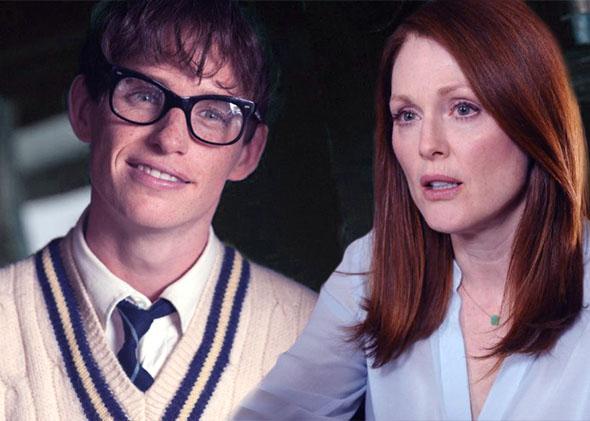Do you think of popular films and TV shows as tools for educating the public? I generally don’t. In fact, for more than six years I wrote a column called The Unreal World demonstrating just that failing. An executive producer at a major TV series once called me up to protest my critique and said he had been advised on the story line by the Centers for Disease Control and Prevention. But when I asked him if he had followed that advice, he grudgingly admitted that the drive for ratings means that drama comes first and facts come second.
This year is different. The Academy Awards were groundbreaking from a health care as well as from a film perspective because they rewarded medical accuracy. For the first time ever, both the best actress and best actor awards were given for precise performances conveying illness; in both cases the actors expertly demonstrated the effects of deadly neurological diseases on the victim and on those around them. Both films featured the courage of acceptance as well as the difficulty of living with the disease. Both actors became students of the disease, rendering its most subtle details.
In The Theory of Everything, Eddie Redmayne plays the groundbreaking physicist Stephen Hawking, longtime sufferer of amytrophic lateral sclerosis (Lou Gehrig’s disease). His portrayal was so stirring that Hawking himself praised it and even lent his computer-rendered simulated voice to be used in the film. In Still Alice, Julianne Moore gave a disturbingly sensitive rendering of a prominent professor being staggered by early Alzheimer’s disease. Her performance was so effective and accurate that it has drawn the unbridled praise of Alzheimer’s experts. It wasn’t long ago that Hollywood would have steered away from anything so depressing.
Perhaps most importantly, these roles are bringing needed attention to two crippling, deadly diseases at a time when new fields of research are poised to discover possible treatments.
“Pretty darn accurate” is how Jeffrey D. Rothstein, director of the Brain Science Institute and Robert Packard Center for ALS Research at Johns Hopkins University School of Medicine described Redmayne’s performance.
ALS is a disease of motor neurons that leads to the weakening of the muscles they control. The damage extends from muscles in the limbs to the muscles used for swallowing and breathing. The disease is progressive, generally deadly, and there is no cure.
Redmayne, playing Hawking, develops difficulty using his hands while at Oxford in the early 1960s, followed by more clumsiness, limping, tripping, and in a dramatic scene that leads to his diagnosis being made, he falls to the ground and smacks his face on the pavement. “Typically ALS presents with distal limb weakness (80 percent of the time),” Merit Cudkowicz, an ALS expert and chief of neurology at Massachusetts General Hospital told me in an interview. Typical early symptoms are “hand weakness—dropping things—trouble cutting nails or fine movements; or foot drop—tripping, more difficulty with walking.” She added that ALS is also associated with muscle twitching (fasciculations), which Redmayne demonstrates in the film. Difficulty with speech and swallowing tend to come later, as they do with Redmayne’s portrayal of Hawking, followed by difficulty breathing and the need for a tracheostomy tube, which Hawking had inserted in the 1980s.
ALS is generally fatal in two to five years, but it can be variable, as demonstrated by Hawking, who is still alive at age 73.
Julianne Moore plays Alice Howland, a 50-year-old linguistics and cognition professor at Columbia University who suddenly can’t find her words during a lecture. Afterward, her struggles with language and memory increase, and she becomes disoriented during her daily jog around campus. She begins to lose things and forgets to go to meetings she has scheduled. She sees a neurologist and is diagnosed with a form of Alzheimer’s that is caused by a particular genetic mutation. She uses her smartphone to help her compensate for her memory lapses but is soon living in fear and panic. But as with Redmayne as Hawking, Moore as Alice learns to rely on some members of her family for support. Moore as Alice also brings courage to the role and demonstrates new ways to cope.
Moore has also done an extraordinary job conveying the devastating effects of a neurodegenerative disease. “They have problems with learning new information,” David Knopman, professor of neurology at Mayo Clinic’s Alzheimer’s Disease Research Center told me. “They forget conversations; they repeat themselves; they have trouble keeping track of time and of the date; they have trouble keeping appointments.” Knopman said that younger patients suffering from early Alzheimer’s, those like Alice, have difficulties with mental focus, multitasking, and solving complicated problems. They “get lost geographically and begin to have difficulty with word finding and name finding.” As with ALS, impressive immunological and genetic research on Alzheimer’s disease is ongoing, but there are no cures. These two films and great performances will help to raise awareness and support the scientific quest for new treatments.
The academy deserves an Oscar for awarding these Oscars.
